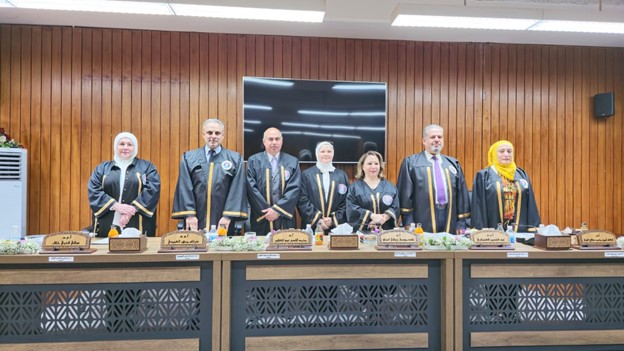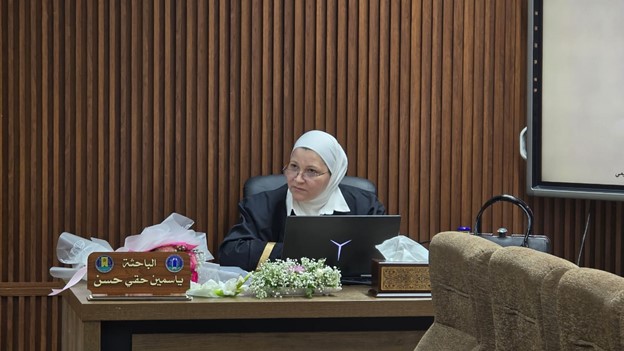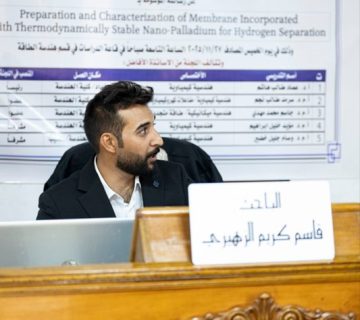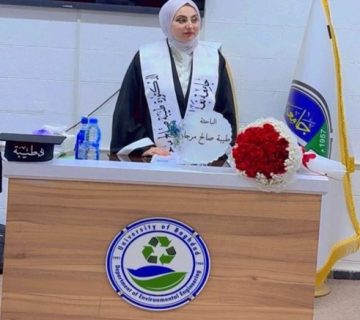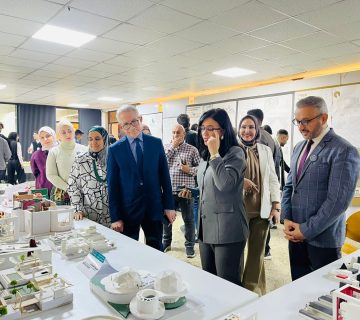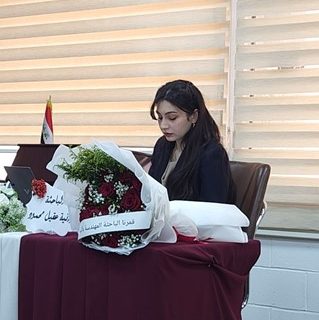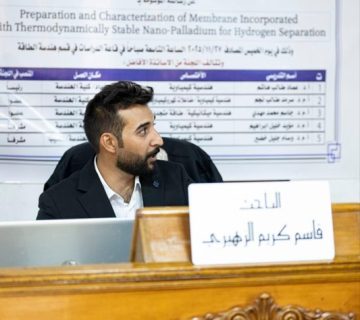On Monday, May 5, 2025, the College of Engineering at the University of Baghdad held the public PhD dissertation defense of candidate Yasmin Haqi Hassan Al-Bayk from the Department of Architecture. Her dissertation, titled “Healthy Design of Urban Space,” was supervised by Prof. Dr. Inaam Mohammed Amin Al-Bazzaz, and the defense took place in Dr. Mohammed Makiya Hall.
The dissertation addresses a pressing contemporary issue — the neglect of health-supportive values in urban environments, a concern that has grown significantly in recent decades and particularly following the COVID-19 pandemic in 2020. This shift has brought forward the “Salutogenesis” approach, which emphasizes factors that promote human health and well-being.
The research focused on Psychological Restoration, a concept from Environmental Psychology, which describes the ability of individuals to recover from mental fatigue and regain voluntary attention needed for daily functioning.
The research problem was defined on two levels:
-
General Problem: How to activate the concept of psychological restoration in the design of urban spaces and landscapes.
-
Specific Problem: The absence of a comprehensive theoretical framework defining and integrating the dimensions of psychological restoration, and clarifying its perceived sensory aspects.
The study aimed to develop a theoretical model establishing the essential foundations and perceived sensory dimensions of psychological restoration in urban environments. The main hypothesis proposed that the restorative experience is achieved through a “sense of coherence” and environmental connectedness within a health-supportive urban context.
The dissertation included five chapters:
-
Chapter 1: Provided the foundational knowledge on healthy design and psychological restoration.
-
Chapter 2: Established the theoretical basis for integrating walkability and connected centers in enhancing perceived sensory dimensions of restoration.
-
Chapter 3: Developed a comprehensive framework based on Perceived Sensory Dimensions (PSD), proposing a model where restoration is driven by a sense of coherence and perceived environmental wholeness.
-
Chapter 4: Outlined the research methodology, employing tools such as Likert-scale surveys, Space Syntax, Walk Score, and GIS to test the hypothesis.
-
Chapter 5: Presented the key findings and final recommendations.
Key Findings:
The results from both theoretical and practical components provided a clear mechanism for achieving psychological restoration in urban spaces. This was realized through coherence and connectedness in nature-integrated environments, facilitated by positive urban spaces offering refuge, fascination, compatibility, and continuity.
The research supports the concept of Evidence-Based Design, enabling architects to identify and apply design patterns that enhance perceived sensory quality and promote restorative experiences, making urban environments a source of health.
Defense Committee Members:
-
Prof. Dr. Ghada Mousa Razouqi / University of Baghdad / Chair
-
Prof. Dr. Mohammed Qasim Abdulghafour / Al-Nahrain University / Member
-
Asst. Prof. Dr. Abdulhussein Abdulali Al-Askari / University of Baghdad / Member
-
Asst. Prof. Dr. Durgham Mazhar Kareem / University of Baghdad / Member
-
Asst. Prof. Dr. Sally Fakhri Khalaf / University of Baghdad / Member
-
Prof. Dr. Inaam Mohammed Amin Al-Bazzaz / University of Baghdad / Supervisor
After thorough discussion and evaluation, the candidate was awarded a PhD in Architecture.

